Kartarpur Corridor depicts Pakistan’s desire for religious harmony and peaceful coexistence.
The corridor provides Sikh Community facility to visit their holy site, Gurdwara Darbar Sahib, in Pakistan without visa.
However, India has been engaged in downplaying Pakistan’s peaceful gestures instead of reciprocating them. It has embarked on an arduous journey of discrediting Pakistan internationally by using its economic and diplomatic clout.
Indian efforts would not deter Pakistan from its commitment to promote religious tolerance, protection of minority rights and eagerness for peace in the region.
After the partition of British Indian in 1947, many pilgrimage sites important for the Sikhs turned out to be at different sides of the Pakistan-India border.
Gurdwara Darbar Sahib is located in Pakistan which is the second holiest site in Sikhism, where Guru Nanak (1469-1539) spent last 18 years of his life.
Prime Minister Imran Khan inaugurated Kartarpur Corridor on 09 November 2019 which provides visa-free access to Sikh pilgrims from India.
This corridor connects Gurdwara Darbar Sahib located in Pakistan’s Narowal district with the Dera Baba Nanak shrine in Gurdaspur district in Punjab, India.
On this occasion, Prime Minister Imran Khan gave historic remarks by saying: “Today we are not only opening border but also our hearts for the Sikh community.”
This statement reflects the underlying philosophy of the people of Pakistan who believe in peaceful co-existence.
The corridor permits 5000 Indian pilgrims per day to visit their holy site in Pakistan throughout the year.
· The Corridor was completed despite tension with India as Pakistan fulfilled a longstanding demand of the Sikh community.
It reflects Pakistan’s commitment to vision of founding fathers who envisaged a state that would ensure rights of minorities.
· UN chief Antonio Guterres visited the Gurudwara Darbar Sahib and said that the opening of the Kartarpur Sahib Corridor is a practical example of Pakistan’s desire for peace and inter-faith harmony.
· The operationalization of Kartarpur corridor came at a time when Muslims, Sikhs and other minorities in India are facing systematic persecution at the hand of right-wing BJP government.
Response Narrative· It is permanent to mention that the state of minorities in India is dire. India, under the rule of Prime Minister Narendra Modi, is undergoing an immense rise of religious nationalist vigilante groups and worsening social discrimination, posing a grave threat to the religious freedom of minorities, particularly Muslims and Christians.
· A recent Pew Research Center report revealed that India had the highest level of social hostility and violence based on religion or belief of any country in the world.
Moreover, Covid-19 pandemic had further exacerbated problems as Muslims were accused of “deliberately spreading the virus” and labelled as “bio-terrorists” and “corona-jihadists”.
· According to the US Commission on International Freedom of Religion or Belief, the Indian authorities predominantly arrest Muslims and Christians for conversion activities, whereas mass conversions to Hinduism often take place without any interference from the authorities.
· According to Human Rights Watch 2021 report, authorities in India have adopted laws and policies that systematically discriminate against Muslims and stigmatize critics of the government.
Prejudices embedded in the government of the ruling Hindu nationalist Bharatiya Janata Party (BJP) have infiltrated independent institutions, such as the police and the courts, empowering nationalist groups to threaten, harass, and attack religious minorities with impunity.










